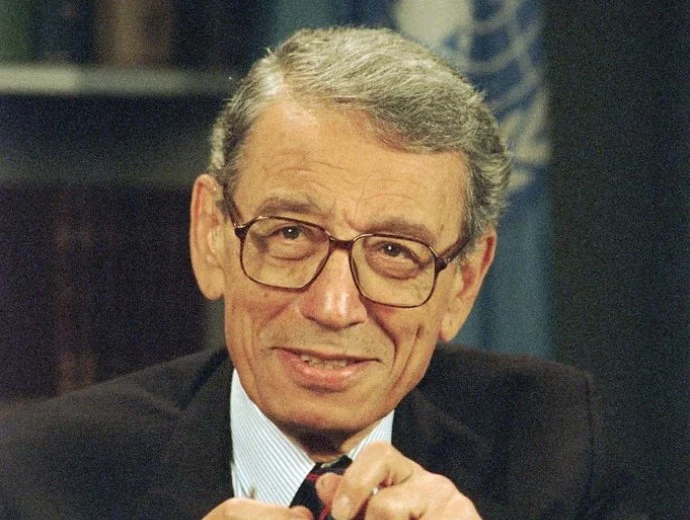IN HIS REGULAR COLUMEN, Professor Adekeye Adebajo writes about the ongoing legacy and impact of the first African and first Arab United Nation’s Secretary General, Boutros Boutros-Ghali.
EGYPTIAN scholar-diplomat Boutros Boutros-Ghali, who died in February 2016 as the first African and first Arab UN secretary-general 30 years ago is portrayed in my new short biography, Boutros Boutros-Ghali, as a prophet, pharaoh and pope.
The widely published Egyptian was a renowned professor of international law and international relations at the University of Cairo for 28 years, making him the most intellectually accomplished of the nine UN secretaries-general.
He acted as a peacemaking “prophet”, serving as Egypt’s minister of state for foreign affairs for 14 years and leading negotiations, between 1977 and 1981, that culminated in a peace treaty with Israel, events captured in his 1997 memoir Egypt’s Road To Jerusalem.
As UN secretary-general from 1992-1996 Boutros-Ghali played the role of a stubborn “pharaoh”, often imperiously standing up to powerful members of the 15-member UN Security Council. By 1994 the UN had deployed 75,000 peacekeepers to 17 trouble spots, compared to just 13 missions in the previous four decades.
Boutros-Ghali also pursued the role of a secular “pope on the East River” in leading conceptual debates on development, democratisation and human rights.
A Coptic Christian from a rich and politically connected family, Boutros-Ghali acquired a deep sense of noblesse oblige from his family heritage. His grandfather, Boutros Ghali Pasha, had served as prime minister of Egypt under the British protectorate, before being assassinated by a political extremist in 1910. Two uncles had also served as foreign minister and another as agriculture minister.
Boutros-Ghali, however, was the ultimate outsider: a patrician within a mass of poverty in his country; a Copt within an overwhelmingly Muslim society; and an Arab within an overwhelmingly black African continental population.
As UN secretary-general he clashed with the world body’s most powerful member — the US — earning him the unenviable tag of being the only secretary-general to have been denied a second five-year term. The Egyptian bluntly condemned the double standards of three powerful Western members of the council — the US, Britain and France — in selectively authorising UN interventions in what he described as “rich men’s wars” in Europe’s Balkans, while neglecting Africa’s orphan conflicts.
He chided them for manipulating the UN over Iraq and Libya. He insisted on a veto over air strikes in Bosnia, refused Washington’s demand for a UN deployment in Haiti until troops and time-frames had been agreed, and berated the council for dumping impossible tasks on the world body without providing it with the resources. Boutros-Ghali recorded his tenure in a trenchant 1999 memoir, Unvanquished: A US-UN Saga.
The Egyptian enjoyed peacekeeping successes in Mozambique, Cambodia and El Salvador, which resulted in important conflict management innovations in the post-Cold War era. He suffered spectacular failures in Rwanda, Bosnia, Somalia and Angola. He also achieved some success in promoting norms of international transitional justice, supporting the interests of poor developing countries against the more parochial interests of powerful, richer countries.
Boutros-Ghali often expressed the Southern criticism that the rich North was too focused on security issues to the detriment of socioeconomic development. He thus frequently decried the lack of democratisation on the UN Security Council, and in the World Bank and IMF.
The Egyptian’s greatest legacy will undoubtedly be his 1992 An Agenda for Peace, a framework developed at the end of the Cold War for a new global security architecture, which is still widely used today. It outlined a continuum from conflict prevention to peacemaking to peacekeeping to peacebuilding, while advocating the strengthening of regional peacekeeping bodies to lighten the UN’s burden.
Current Portuguese UN secretary-general António Guterres acknowledged the continuing relevance of Boutros-Ghali’s Agenda on its 30th anniversary, by seeking to shape “a new agenda for peace” as part of his current high-level advisory board on global public goods.
Professor Adekeye Adebajo is professor and senior research fellow at the University of Pretoria’s Centre for the Advancement of Scholarship.










